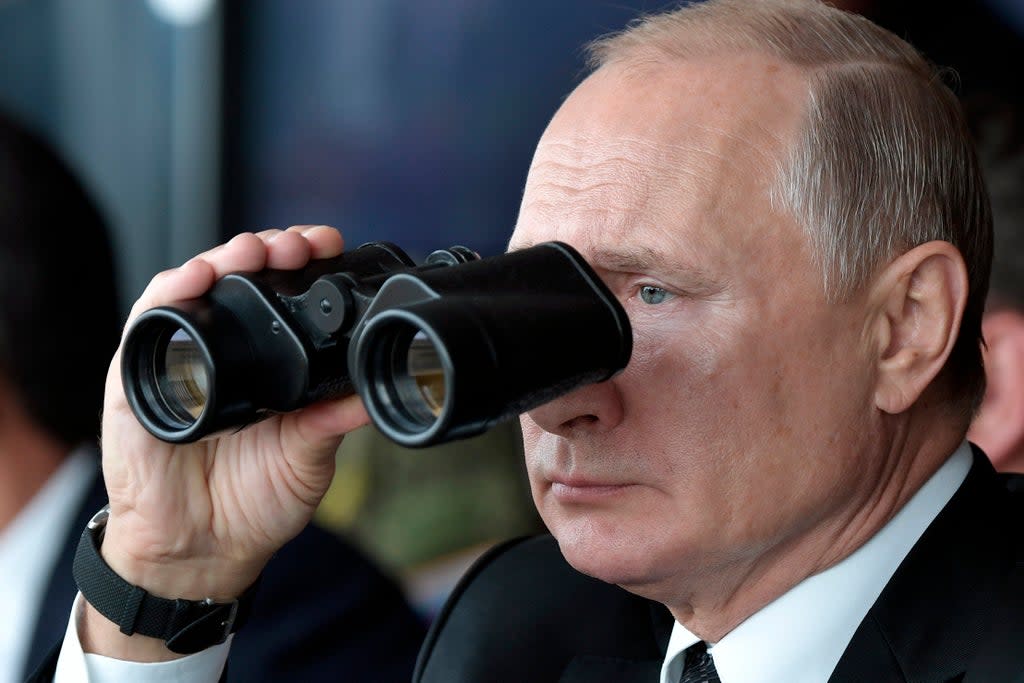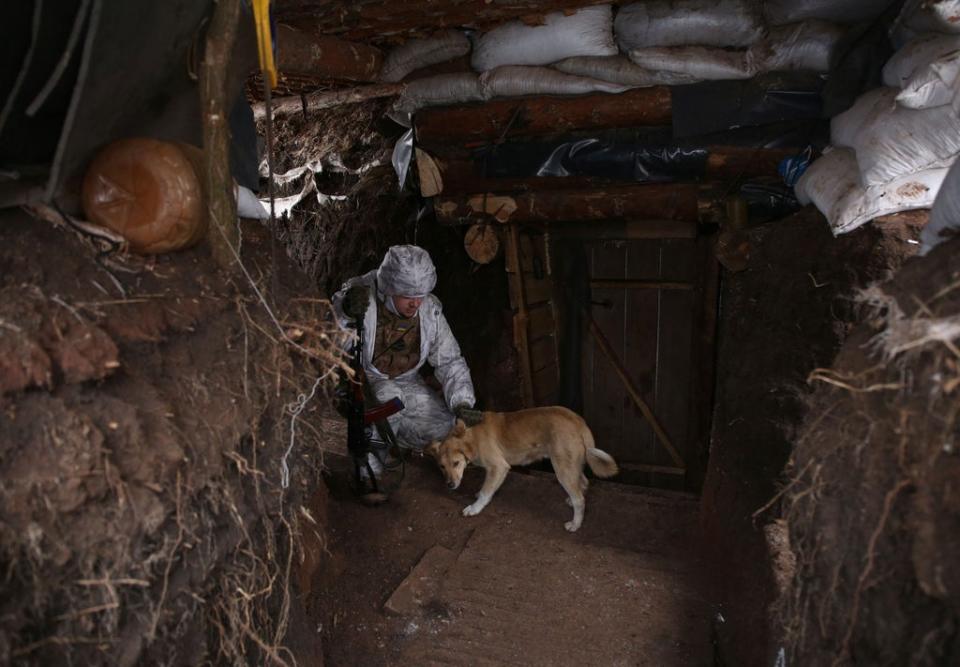Ukraine-Russia crisis: Nato sending more fighter jets and ships to eastern Europe as war fears grow

- Oops!Something went wrong.Please try again later.
- Oops!Something went wrong.Please try again later.
Nato says it’s sending additional ships and fighter jets to eastern Europe as fears of an imminent Russian invasion of Ukraine grew.
Secretary general Jens Stoltenberg said Nato would take “all necessary measures” to protect and defend allies.
“We will always respond to any deterioration of our security environment, including through strengthening our collective defence,” Mr Stoltenberg said.
To bolster Nato’s presence in eastern Europe, allies have announced various deployments in support of Ukraine. Denmark is sending a war ship to the Baltic Sea and is set to deploy four F-16 fighter jets to Lithuania in support of Nato’s long-standing air-policing mission in the region.
Spain is sending ships to join Nato naval forces and is considering sending fighter jets to Bulgaria. France are also ready to send troops to Romania on Nato’s command with the Netherlands sending two F-35 fighter aircraft to Bulgaria from April to support Nato’s air-policing activities in the region.
And countries closest to Russia — Estonia, Latvia and Lithuania — have confirmed they plan to send US-made anti-tank and anti-aircraft missiles to Ukraine.
The United States has also made clear that it is considering increasing its military presence in the eastern part of the Alliance, and moving some of its troops stationed in western Europe eastwards.
The latest announcement was denounced by Russia. Deputy foreign minister Alexander Grushko said Nato was “demonising Russia” and accused it of using “threats and military pressure”.
Russia has massed an estimated 100,000 troops near Ukraine’s borders and is demanding that NATO promise it will never allow Kyiv to join the organisation, but denies it is planning an invasion.
It came on another day of diplomatic tension in capitals across the world amid fears Europe could be on the verge of a catastrophic conflict.
Britain and the US announced they were moving some staff and families from their embassies in the Ukrainian capital, Kyiv, over growing fears of war. British prime minister Boris Johnson, who is fighting to save his political life, warned Russian leader Vladmir Putin that an invasion of Ukraine would be “disastrous”, a “painful, violent and bloody business” and warned it could be a “new Chechnya”.
Ukraine’s Foreign Ministry spokesman, Oleg Nikolenko, said the American decision was “a premature step” and a sign of “excessive caution”. He said that Russia is sowing panic in order to destabilise Ukraine.
Meanwhile, the European Union said it had stepped up sanction preparations and warned that “any further military aggression by Russia against Ukraine will have massive consequences and severe costs”.
Separately, it also committed to increase financial support for embattled Ukraine, vowing to push through a special package of 1.2 billion euros (£1 billion) in loans and grants as soon as possible. For now though, it is keeping embassy staff in the Ukraine capital.
Kremlin spokesman Dmitry Peskov said Nato and Washington were the reasons for escalating tensions, “not because of what we, Russia, are doing”.

The West is also nervously watching Russian troop movements and war games in Belarus for any signs that a new invasion of Ukraine is imminent. Russia has already invaded Ukraine once, annexing the Crimean Peninsula in 2014. Moscow has also supported pro-Russian Ukrainian separatists fighting the Kyiv government in the Donbass region. Fighting in eastern Ukraine has killed around 14,000 people and still simmers.
Irish Foreign Minister Simon Coveney said he would inform his counterparts that Russia plans to holds war games 240 kilometres (150 miles) off Ireland’s southwest coast — in international waters but within Ireland’s exclusive economic zone.“This isn’t a time to increase military activity and tension in the context of what’s happening with and in Ukraine.” Coveney said. “The fact that they are choosing to do it on the western borders, if you like, of the EU, off the Irish coast, is something that in our view is simply not welcome.”Questions have been raised about just how unified the EU approach to Russia is, however. Diverse political, business and energy interests have long divided the 27-country bloc in its approach to Moscow. Around 40 per cent of the EU’s natural gas imports come from Russia, much of it via pipelines across Ukraine — and many are skittish about being cut off from that supply in winter - as energy prices soar.
On Monday, Hungary said it did not “want a new Cold War” in Europe and was supporting all diplomatic efforts to avert war.
The EU’s two major powers - France and Germany - appear most cautious. French President Emmanuel Macron has renewed previously rejected calls for a summit with Putin.
Late on Saturday, the head of the German navy, Vice Admiral Kay-Achim Schoenbach, resigned after coming under fire for saying that Ukraine would not regain the Crimean Peninsula, and for suggesting that Putin deserves “respect”.
At the weekend, Britain said it Russia was trying to install a puppet government in Ukraine, headed by man called Yevhen Murayev.
Mr Murayev denied the claim and told The Independent it was an “absurd but very damaging fantasy”.
Vadym Prystaiko, Ukraine's ambassador to the UK, said a Russian invasion is "very likely" but said that "there is still room for diplomatic resolution".
However, Russia's foreign minister accused the UK of circulating "disinformation" - and told the Foreign Office to "cease these provocative activities" and "stop spreading nonsense".

